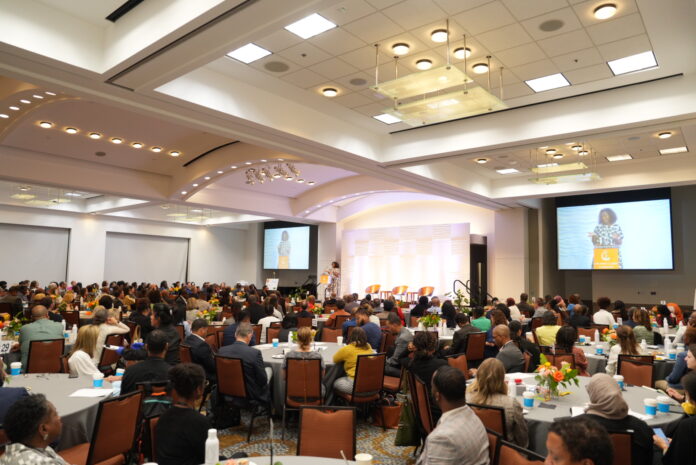The report reveals some improvements since 2019 but racial disparities and inequalities still exist in Atlanta.
(Atlanta – Thursday, May 2, 2024) – Today, the Annie E. Casey Foundation released insights from their latest report in their Changing the Odds series: Changing the Odds: Comprehensive Solutions for Atlanta’s Future.
Since 2015, the Changing the Odds report series has tracked neighborhood, education and economic data by race to assess disparities and highlight solutions for policymakers, business and community leaders.
This year, nearly 300 community leaders and business, government and education sector members convened to discuss the report’s insights and brainstorm potential solutions to address some of Atlanta’s known and unknown challenges, some of which were illuminated during the Covid-19 pandemic. The goal of the collective working-session is to work towards helping ALL Atlantans fully contribute to and benefit from Atlanta’s growing economy.
The Casey Foundation, a Baltimore-based national private philanthropy group, conducts the series through its Atlanta Civic Site to look at solutions for racial inequity through public and private partnerships.
The report states:
Since the first Changing the Odds in 2015, the city of Atlanta has made significant progress in addressing barriers to opportunity faced by many of its residents of color. Despite gains, progress remains uneven and disparate among racial groups. Black Atlantans continue to face disproportionate challenges in their neighborhoods, schools and access to economic opportunity, impeding their ability to thrive in a rapidly growing city.
The 2024 report noted some positive shifts in terms of education. Atlanta Public Schools have reached an all time high school graduation rate at 87 percent in 2023. The number of Atlanta Public School students enrolled in Advanced Placement courses has also increased in recent years, although the report also stated AP courses are not evenly distributed.
While on the surface, graduation rates for Black and Latino students look promising, further inspection of third grade reading and eighth grade math outcomes point to a downward trend for the city’s younger students. Reading proficiently by the end of third grade is a major predictor of whether a student will graduate from high school. While reading and math scores fluctuated during the pandemic and have since gained some ground, the data show wide racial disparities in Atlanta. Proficiency rates for both third grade reading and eighth grade math among Black students plunged by 12 and 16 percentage points, respectively, in the 2020–21 school year. In the 2022–23 school year, math and reading scores for white students exceeded those of Black students by nearly 60 percentage points in both subjects.
The report also examined the wealth gap between racial categories and while there were some positives, there were some downturns. Median incomes for Black households increased by more than $6,000 in inflation-adjusted dollars between 2013 and 2021, the difference in median earnings between Black ($38,854) and white ($114,195) households increased by $3,529 to reach a difference of $75,341 in 2021. Lower earnings translate into lower rates of savings and higher rates of delinquent debt (60 days or more past due). Financial experts recommend that households have savings and accessible assets sufficient to cover expenses for at least three months to weather a financial crisis. In 2020, more than half of Black Atlantans lacked this basic financial cushion, compared to 14% of white residents. In 2022, communities of color in Fulton County had nearly three times the level of delinquent debt as white communities, with the largest portion from medical expenses (19%) followed by student loans (11%).
The report examines Atlanta’s post-Covid-19 data landscape including key areas for children’s healthy development, enduring and growing racial disparities, recommendations to address these disparities and support thriving communities, educational achievement and economic opportunity for all Atlantans.
Read the 2024 Changing the Odds: Comprehensive Solutions for Atlanta’s Future here.
This article was written by Nsenga K. Burton, Ph.D., founder & editor-in-chief of The Burton Wire. Follow Nsenga on social media @Ntellectual.
Follow the Burton Wire @TheBurtonWireNews or @TheBurtonWire on IG.









